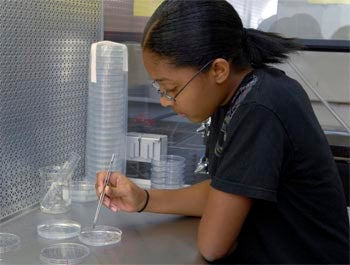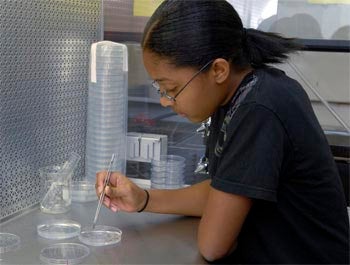 to educate public about increasingly important issue
to educate public about increasingly important issueIndustry-supported curriculum makes URI a leader in biotech education
KINGSTON, R.I. — October 20, 2006 — The University of Rhode Island’s College of the Environment and Life Sciences launched a web-based biotechnology course today that will allow anyone around the world to enroll at any time to learn the key concepts in the increasingly important discipline. Best of all, the course lectures are available free to the general public, and high school students may enroll for just $195 and get college credit.
The course was announced at a ceremony Friday during which URI and local high school students mingled with government officials, biotechnology industry representatives and researchers.
“The tools of biotechnology are being used in an increasing number of industries, and understanding the issues involved are important for everyone in the global community,” said Jeff Seemann, dean of URI’s College of the Environment and Life Sciences. “This Internet-based curriculum that we call ‘The Way We Work With Life’ is now accessible to a broad range of the public any time and anywhere they are.”
The course has been offered in a traditional classroom setting for three years at either the URI Kingston or Providence campuses, and it was field tested as a Web-based course last year. It incorporates a series of lectures by industry experts, online readings, and tests.
The course was designed by URI Biotechnology Professor Albert Kausch with input from biotechnology researchers and industry representatives, including those from Pfizer and Amgen. It is also supported by Life.edu, a non-profit biotechnology educational organization founded by Kausch with industry support. In addition to URI students, those enrolled in the classroom-based course have included high school students and teachers, public officials, new employees of biotech companies, and the general public.
“U.S. Education Secretary Margaret Spellings said in a recent visit to Rhode Island that she was an advocate of dual-enrollment courses — those where high school students enroll alongside undergraduate students — and that’s exactly what we�ve been doing with this class for several years,” Kausch said. “It really gives the high school students a leg up on their peers and introduces them to concepts they typically wouldn’t learn about until much later.”
The Way We Work With Life isn’t the only URI biotechnology course that is open to high school students. Sixty students from eight high schools in Rhode Island are currently participating in lab projects alongside URI undergraduate and graduate students who are enrolled in an upper-level class in genetic engineering. The high school students work with University students who receive their own plant gene construct and use modern gene transfer techniques to contribute to research projects involving ethanol production and genetic modification of corn. Participating students are enrolled at Burrillville, Barrington, Cumberland, South Kingstown, Cranston East, Exeter-West Greenwich and Cooley (Providence) high schools and Davies Vocational-Technical School (Lincoln).
“The combination of traditional science labs open to interested high school students, classroom courses open to the general public, and the online course open to anyone any time has made URI a national leader in biotechnology education,” Seemann said. “And we’re only just beginning.”

